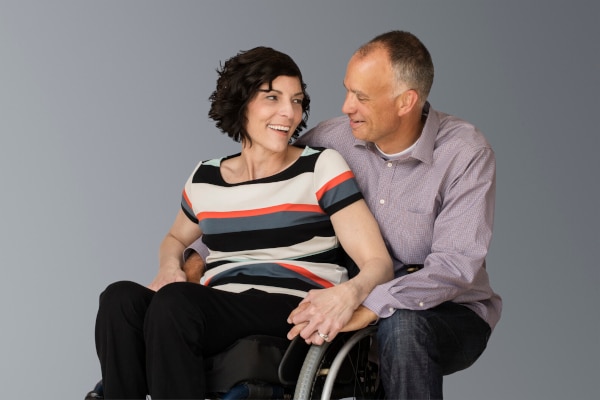This article explains how your caregiver can support you when you use TAI. Share this information with them so they know how best to help you!
Having conversations around TAI
When talking about TAI or your bowel issues, it is always up to you how much you want to share. If you have a close family member or relative who you would like to support you emotionally, you do not need to share all the ins and outs of TAI with them, unless you would like to. Either way, they can talk with you if you are feeling down and help to motivate you to keep going.
Support in the event of an accident when you are out
You may have one or two designated friends or family members who you agree you can call if you find that you experience bowel issues when you are out and about. Perhaps you agree that they will come and meet you and bring you any additional things you require. Perhaps you just need them to talk to you and keep you calm while you manage the situation.
Never underestimate the importance of having a supportive network whom you can turn to when necessary. To set this up, be open and honest in your communication with them about your bowel. Explain why you would like them to be someone you can contact in the event of an emergency and what this would mean for them. They will be happy to support you.
Supporting with the irrigation
Sometimes it is necessary to have a caregiver support you with your irrigations. If this is the case, it is important that your caregiver has been trained in the use of Peristeen Plus by a healthcare provider before they start helping you. It can also be a good idea to read through our step-by-step guide or watch our video together before starting. This way, you can align on what to do and how to best help you in each step. You should always read the Instructions for use (provided with your product) before use.
You may also want to use our irrigation checklist to make sure you have everything in order before you begin your irrigation.

Inserting and removing the Peristeen Plus rectal catheter with caregiver help
If your caregiver is going to help you do your irrigation, it’s important they follow the steps correctly and have been trained by a healthcare provider. Pump water into the catheter packaging to lubricate the catheter. See the Instructions for use booklet provided with your product for full details.
The catheter should be inserted without using force. If you or your caregiver have trouble inserting your catheter, reach out to your healthcare provider for further guidance.
Once you have pumped the water, you will need to remove the catheter. Deflate the balloon first. Often the catheter will slide out by itself. If it does not slide out, you or your caregiver can gently remove the catheter from the rectum.
At this point the colon will start to empty itself. If nothing happens soon after the catheter is removed, you can try coughing or moving. Putting some gentle pressure to the upper part of your abdomen can also get the emptying process going. Emptying time varies for individuals, but commonly takes 30 minutes on average.
It may be that you want complete privacy at this point. You can agree with your caregiver how much support they should give and you should always feel free to communicate your needs.
Cleaning your Peristeen Plus system
Whether you manage the irrigation process yourself or with help, you may still appreciate support when cleaning your Peristeen Plus system. You can explain this process to your caregiver and ask them to help you.
Apart from the single use catheter, all other parts of your Peristeen Plus can be washed in mild soapy water. The tubes can be replaced if soiled.
Always remember to dry your TAI system for at least 1 hour before it is packed away.
Full cleaning & drying instructions can be found in the Instructions for use.



